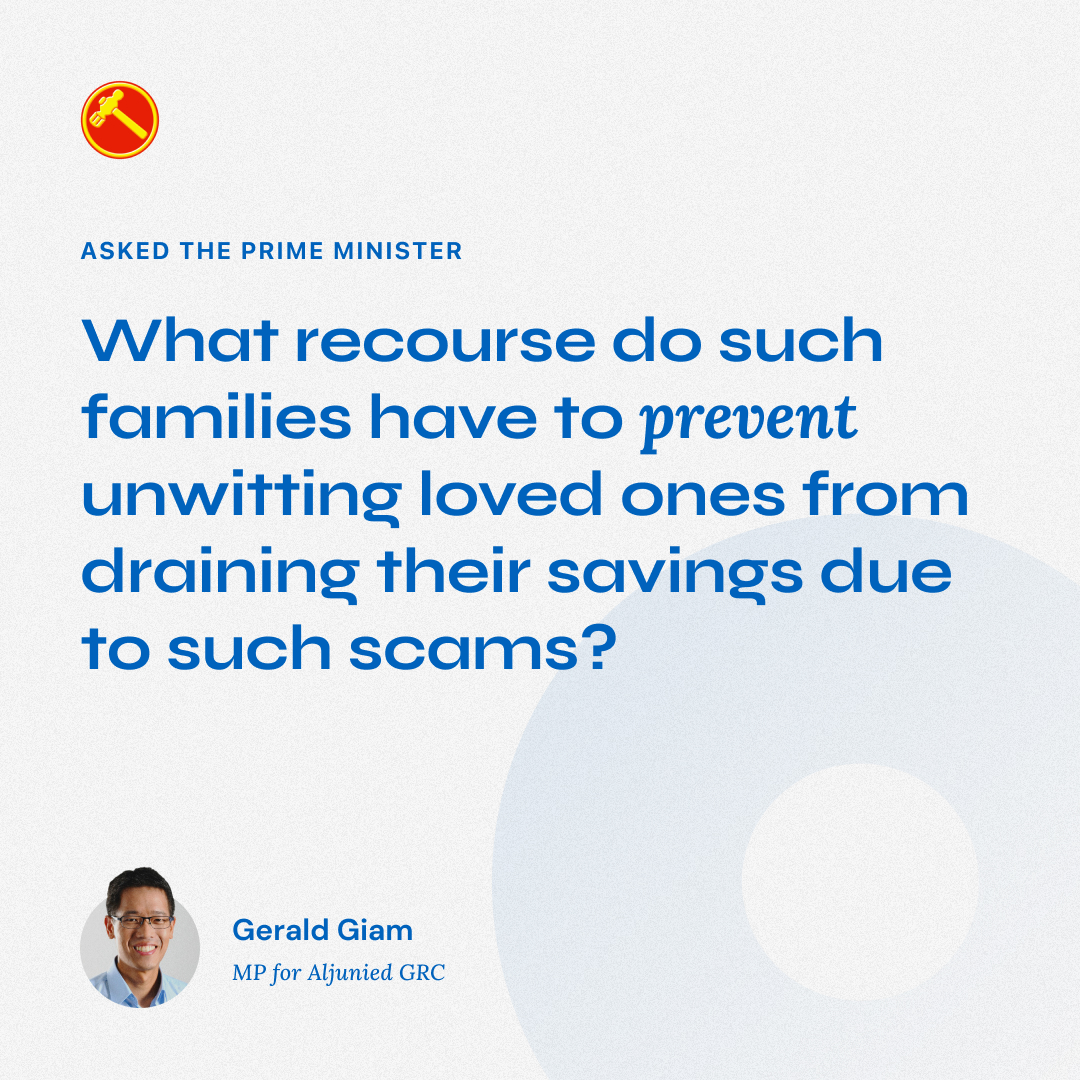The number of scams in Singapore increased 165% in the first half of 2021 compared to 2020. The most common scams include internet love scams, loan scams, tech support scams and the impersonation of Chinese officials. I have met and assisted residents who have been victims of all of these scams. Listening to their stories is heart-rending. Some had lost their entire life savings after sharing a one-time password (OTP), while others watched helplessly as loved ones unwittingly continued to send money to scammers.
I was particularly concerned about my residents in the latter group who approached me. After writing an appeal to the Monetary Authority of Singapore (MAS), the banking regulator, I realised that there is no facility to enable individuals to stop family members from making outbound fund transfers to suspected scammers. This was confirmed in a response to a Parliamentary question I asked on 2 Nov 2021. Senior Minister Tharman Shanmugaratnam said that banks generally act only upon the instructions of the account holder unless they had provided written consent and mandated another person to operate the account on their behalf.
While I understand the importance of not undermining the agency of bank account holders, I find the current policy position unsatisfactory. I was alarmed to learn that my resident’s mother may be preparing to sell the family home to cash out her money to give to a scammer. Surely there should be some recourse for families to prevent unwitting loved ones from losing their family savings to scammers. It was reported that some bank officers in OCBC have gone to great lengths to persuade their customers not to make transactions they suspected to be fraudulent. They deserve to be commended for their persistence. However, effective safeguards against scams cannot depend solely on the dedication of individual bank officers.
I hope the MAS will urgently look into putting in place more effective safeguards to protect Singaporeans and their loved ones from becoming victims of scams.
Here is the full answer to my question:
FACILITY FOR INDIVIDUAL TO PREVENT OUTBOUND FUNDS TRANSFER FROM BANK ACCOUNTS OF CLOSE FAMILY MEMBERS SUSPECTED TO BE VICTIMS OF SCAMS
Mr Gerald Giam Yean Song asked the Prime Minister (a) whether there is currently a facility for an individual to prevent close family members whom they suspect are victims of scams from making outbound funds transfers from their bank accounts; and (b) what recourse do such families have to prevent unwitting loved ones from draining their savings due to such scams.
Mr Tharman Shanmugaratnam (for the Prime Minister): There is no facility to enable an individual to stop outbound fund transfers from the bank accounts of family members whom they suspect may become victims of scams. Banks generally act only upon the instructions of the account holder unless he has provided written consent and mandated another person to operate the account on his behalf. This is to protect the rights of the account holder.
But Mr Giam also asks how family members can help one another avoid becoming victims of scams. Anyone who suspects that a family member has been a victim of a scam, or is being targeted by scammers, should advise the family member to contact his or her bank and make a police report.
In the event that the suspected victim does not agree to do so, the concerned family member can contact the Singapore Police Anti-Scam Hotline, where trained staff are available to provide independent advice to the suspected victim.
We can help our family members to take pre-emptive measures to better protect themselves. We can share with them information and other resources on scam prevention. The National Crime Prevention Council (NCPC) has a dedicated website – scamsalert.sg – which provides useful tips on how to identify and avoid falling prey to scams, as well as a mobile application – ScamShield – which will block scam calls based on a list of numbers maintained by the Police. We can also discuss with family members the banking facilities they require for daily use, and advise them to protect their accounts by setting appropriate transaction limits and lowering transaction alert thresholds. These are basic measures that can help them stay alert to unauthorised transfers and limit their financial losses in the event of an unauthorised transaction.
MAS, together with the Singapore Police Force and the financial industry, will continue to look into measures to help consumers defend themselves against scams.
Source: https://sprs.parl.gov.sg/search/sprs3topic?reportid=written-answer-9267
